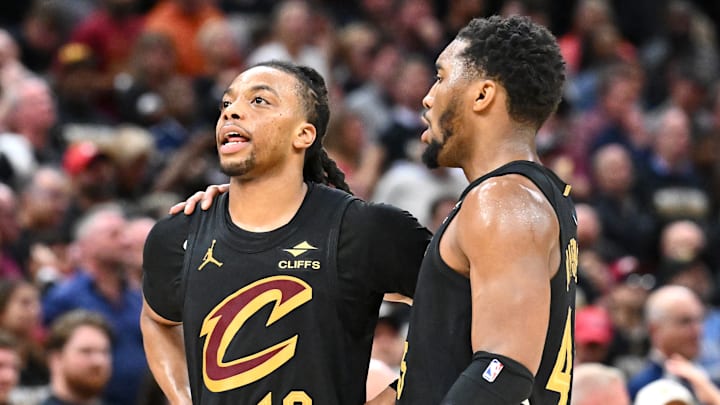If the Cleveland Cavaliers are going to trade Darius Garland, it must be for a return to that helps them take a clear step toward winning a title—and there's zero margin for error.
The Cleveland Cavaliers are entering the 2025 offseason facing the same criticism they received in 2023 and 2024. Skeptics insist that a backcourt consisting of Darius Garland and Donovan Mitchell is destined to fail, as their size renders any hope of thriving defensively in the playoffs obsolete.
Whether it's fair or foul, the narrative exists. Cleveland, however, only has one way to justify trading Garland: A return that instantly makes it a true contender.
It sounds simple enough, but the Cavaliers can't justify trading Garland for anything less than a return that elevates the team to competing for a championship. Garland and Mitchell may be undersized, but they're also All-Stars with talent levels that can't be overlooked.
As such, the decision to trade a 25-year-old point guard who's already a two-time All-Star can't be taken lightly.
Over the past four seasons, Garland has averaged 20.6 points, 7.4 assists, 2.9 rebounds, 1.3 steals, and 2.6 three-point field goals made per game on .462/.392/.869 shooting. In 2024-25, he was also second on the Cavaliers in points per fourth quarter, posting a superior slash line to Mitchell, and was first in assists in the final frame.
Matching Garland's statistics will border on impossible, but the Cavaliers must find a way to emulate his impact. The question is: How can they do it?
What exactly qualifies as an ideal return for Darius Garland?
In an ideal world, the Cavaliers would be able to swap Garland for an All-Star at small forward—the team's long-standing weakest position. If not, Cleveland would be able to acquire a point guard whose size and defensive acumen would offset the current concerns.
The question facing the Cavaliers is thus: Who among the realistic trade targets they can pursue would actually make a meaningful difference?
Chris Fedor of Cleveland.com recently proposed a series of trade packages that could prove ideal. They were built around incoming players such as New Orleans Pelicans rising star Trey Murphy III, Orlando Magic defensive ace Jalen Suggs, and Minnesota Timberwolves standouts Donte DiVincenzo, Jaden McDaniels, and Terrence Shannon.
It's unclear if any of those teams are interested in trading for Garland, but Fedor provided an accurate evaluation of what's needed in Cleveland.
The Cavaliers need a perimeter defender who can step in and take on the challenges that too often fall on Evan Mobley's shoulders. Yes, Mobley is the reigning Defensive Player of the Year, but if the goal is to win a championship, perimeter depth will be essential.
As such, the Minnesota and Orlando trades are quite appealing, with the likes of DiVincenzo, McDaniels, and Suggs all having strong reputations as quality or even elite defenders.
Murphy, meanwhile, represents the long-awaited opportunity to land a wing who can space the floor and put points on the board at a high level. He averaged 21.2 points per game on .454/.361/.887 shooting in 2024-25, and seems to have exceptional untapped potential as a scorer at just 24 years of age.
Each of those trades, however, reveals how delicate the Cavaliers' situation is—and, as such, speaks to how important Garland truly is.
Trading Darius Garland is an imperfect solution to a bigger issue
No matter what happens with Garland, the Cavaliers' star-heavy starting lineup has masked a bigger issue. One look at the 2025 Conference Finals is all it takes to hammer home the importance of wing depth in the modern NBA, especially on the defensive end of the floor.
Cleveland can make a case for having an elite backcourt and a top-tier interior, but its wings aren't quite up to par when compared to the contenders.
De'Andre Hunter and Max Strus are an intriguing duo at small forward, much as Sam Merrill has the capacity to shoot the lights out and Isaac Okoro has improved his outside efficiency. Lacking a true perimeter stopper, however, has hindered the Cavaliers' championship aspirations.
Perhaps trading Garland for a defensive upgrade would be a step in the right direction, but even still, it's fair to question if that's all Cleveland needs.
Even if the Cavaliers were to acquire a star perimeter defender, Koby Altman would still need to replace the impact of an All-Star scorer and playmaker. That can manifest in any number of ways, but prioritizing defense without playmaking runs the risk of overburdening Mitchell with a larger facilitating role—much as landing a new facilitator would continue to leave the team in need of improved wing depth.
Perhaps the perfect deal is out there for Garland to find a better fit and Cleveland to take a step forward, but unless the Cavaliers walk away as true contenders, it'd be difficult to justify a trade.
